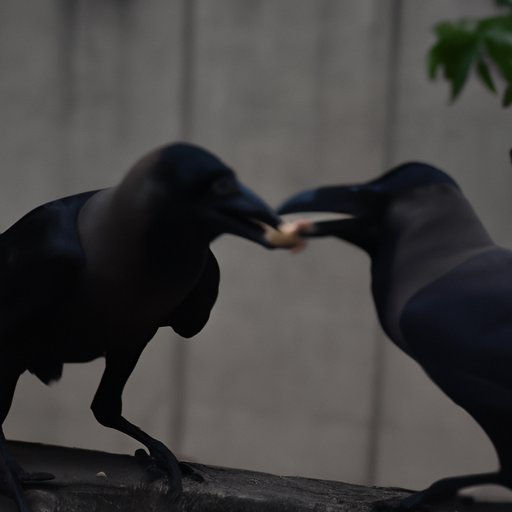
Introduction
Since ancient times, crows have been part of human folklore and have been recognized as intelligent birds. Recent scientific studies have confirmed that they possess complex cognitive abilities and social behavior. Befriending a crow can be a unique and rewarding experience, but it requires patience, consistency, and respect for their space and boundaries. This article is intended to guide those interested in befriending a crow by providing insight into their behavior, the type of food they eat, how to create a safe space, and how to establish trust with them.
Understanding Crow Behavior
Crows are social birds that form family groups, or “murders,” consisting of up to 15 members. They have a complex culture and a sophisticated system of communication that involves a range of vocalizations and body language. Understanding crow behavior is essential to befriending them, so it’s best to approach them slowly and cautiously. Avoid sudden movements and loud noises that may scare them away. When approaching, make eye contact, and speak softly to them to gauge their response.
Crows interact with each other and other species in complex ways. They are known to mob predators, and they exhibit altruistic behavior by feeding and grooming each other. They are also territorial birds that defend their nesting sites vociferously. So it’s essential to observe their behavior and understand when to stay away.
Crows prefer a diet of nuts, seeds, fruits, insects, and small animals. They are opportunistic feeders that can adapt to various environments, which means that they can feed on human food waste, sometimes leading to conflict. Pay attention to the type of food they prefer and ensure it’s healthy for them.
Providing Provisions
Crows are omnivorous, and it’s essential to give them a varied diet. You can offer them raw peanuts, unsalted popcorn, mealworms, fruits, and vegetables. However, avoid feeding them processed or salty foods that may harm their health. It’s also crucial to provide them with clean water, especially in dry weather.
Additionally, feeding crows should be supplemental, not the primary source of their food. They are highly adaptable and can find food on their own. So, don’t overfeed them and never feed them from your hand, leading to them recognizing you as a source of food.
Spend Time Outside
Spending time outside is one of the best ways to befriend crows. Crows are curious and intelligent birds that enjoy observing human behavior. Find a comfortable spot outside and get into the habit of being there consistently. Crows are wary of changes in their environment, and they tend to be cautious about new things. Consistency sends a message that you’re not a threat to their safety and well-being.
You can also create a safe space by providing perches and nesting sites. Crows are attracted to elevated positions where they can observe their surrounding environment and look for danger. Provide a tree or a post where they can perch on nearby or in your garden.
Establishing Trust
Establishing trust is crucial when befriending crows. It requires patience, consistency, and kindness. Crows are wary of new things and people, so it’s crucial to approach them slowly and cautiously. Start by tossing small treats to them from a distance, allowing them to get comfortable with your presence. Gradually increase your proximity, always gauging their reaction.
It’s also essential to understand that crows have excellent memories and can recognize familiar faces and gestures. So, it’s crucial to be consistent in your behavior towards them. Feed them at the same time and place every day, and don’t try to approach them on days when you can’t bring food.
Remember that crows have limits and boundaries. They are wild birds and require a certain distance and space. It’s best to observe them from a distance and avoid approaching them when they are feeding or caring for their young.
Respect Them
Respect is the most crucial aspect of befriending crows. They are intelligent creatures that deserve consideration and care. Crows are sensitive to changes in their environment, and they tend to be wary of people who behave erratically or make loud noises. It’s crucial to take the time to understand their behavior and respect their space and boundaries.
Interacting with crows can be a fun and rewarding experience that enriches our appreciation of the natural world. But, befriending them requires patience, consistency, and kindness. Remember that crows are not pets and require special care. Be respectful, avoid making loud noises, and be consistent in your approach towards them.
Conclusion
Befriending crows is a unique and rewarding experience that requires patience and kindness. Understanding crow behavior, providing them with proper food and water, and establishing trust with them are essential elements to begin a lasting bond. Always treat them with respect, avoid making loud noises, and be consistent in your behavior towards them. With time and patience, forming a bond with a crow can be a life-changing experience.




